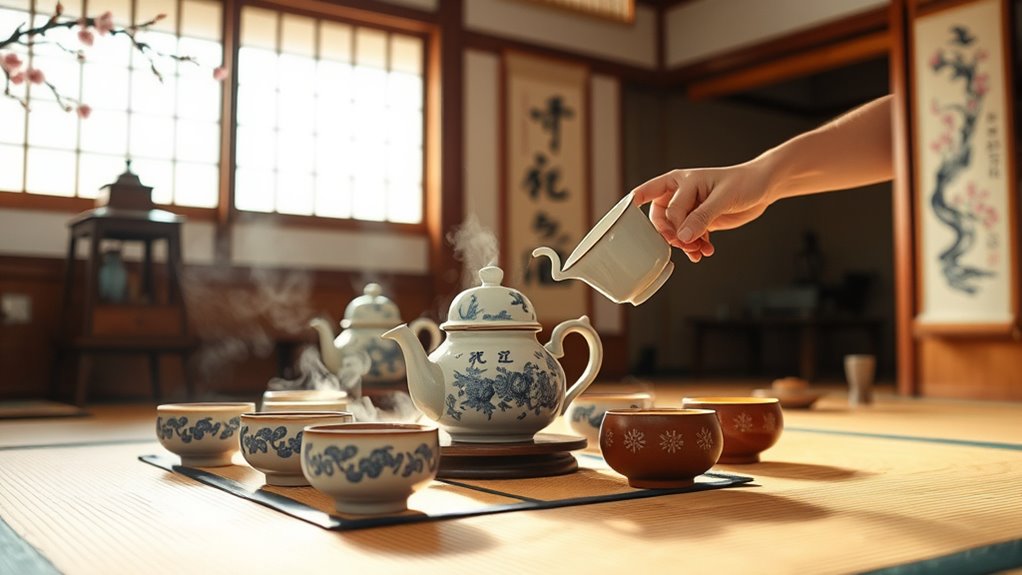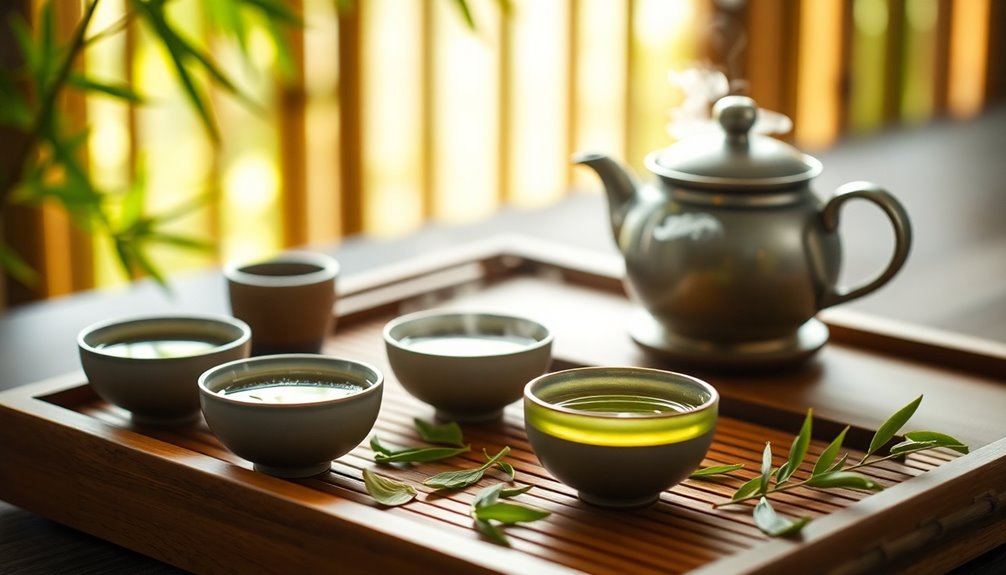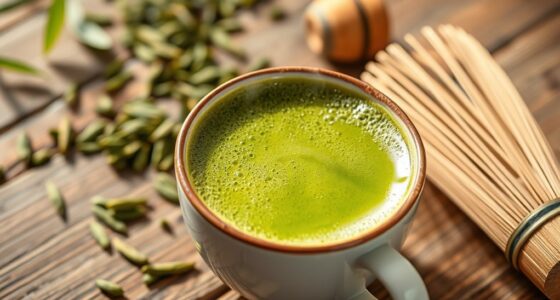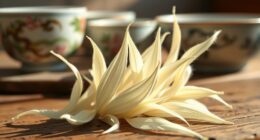Japanese tea holds deep cultural significance in local traditions, embodying artistry, mindfulness, and social harmony. It’s more than just a drink; it’s a ceremonial practice that emphasizes respect, humility, and connection. The precise techniques and handcrafted utensils reflect Japan’s appreciation for beauty and simplicity. As you explore further, you’ll discover how these rituals mirror core values like reverence for nature and community, enriching your understanding of Japan’s cultural identity.
Key Takeaways
- Japanese tea embodies centuries of artistry, philosophy, and social harmony, integral to cultural rituals like tea ceremonies.
- The tea ceremony emphasizes mindfulness, respect, and social bonds through deliberate, graceful actions.
- Handcrafted utensils and aesthetic presentation highlight the importance of craftsmanship and aesthetic appreciation.
- Tea reflects core Japanese values of simplicity, harmony, humility, and reverence for nature.
- Participating in tea rituals fosters community, cultural identity, and embodies Japan’s ideals of mindfulness and social cohesion.
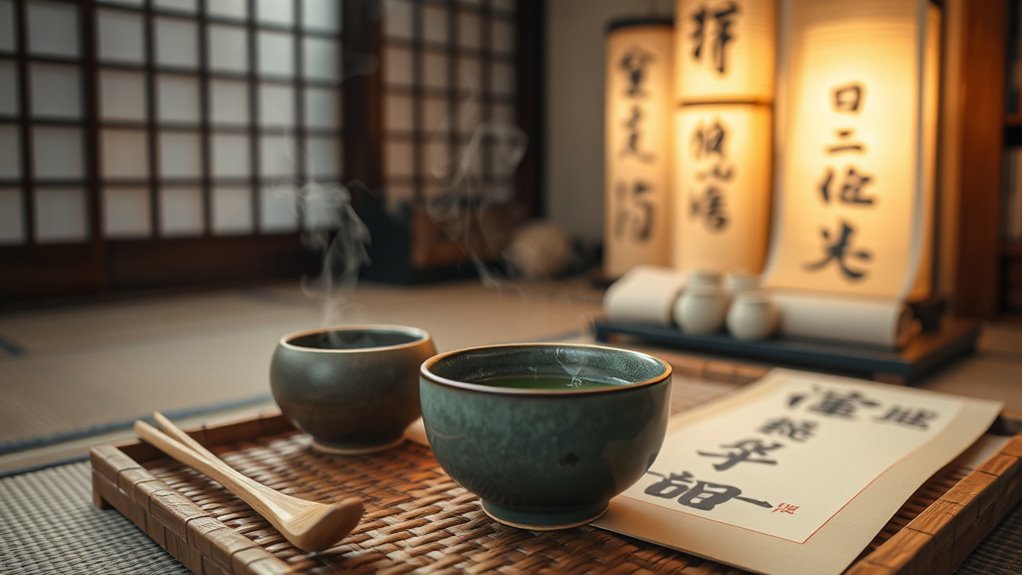
Japanese tea is more than just a beverage; it embodies a deep cultural tradition that reflects centuries of artistry, philosophy, and social harmony. Central to this tradition are tea ceremonies, also known as cha-no-yu, which serve as ceremonial rituals that elevate drinking tea into an art form. When you participate in these ceremonies, you’re not just drinking tea—you’re engaging in a mindful practice that emphasizes harmony, respect, purity, and tranquility. These ceremonial rituals are carefully choreographed, blending precise movements, aesthetics, and spiritual principles that have been passed down through generations. As you prepare and enjoy matcha in this setting, you become part of a centuries-old dialogue between nature, craftsmanship, and Zen philosophy.
Participating in tea ceremonies connects you to centuries of artistry, philosophy, and social harmony through mindful, ritualistic practices.
The tea ceremonies are more than mere routines; they are deliberate acts meant to cultivate mindfulness and social bonds. Every step, from cleaning utensils to whisking the powdered tea, is performed with intention and grace. The utensils used—tea bowls, whisk, scoop—are often handcrafted and hold artistic significance, emphasizing the importance of craftsmanship and aesthetic appreciation. As you sit quietly, following the host’s gestures, you’re invited to focus entirely on the present moment, leaving behind everyday distractions. This ritualistic process fosters a sense of respect and humility, reinforcing social harmony and mutual understanding among participants. It’s a form of silent communication that transcends words, emphasizing shared experience over superficial differences. Additionally, the precise techniques involved in preparing tea highlight the importance of technique and precision in traditional Japanese arts.
In Japanese culture, these ceremonial rituals symbolize much more than the act of drinking tea. They reflect a worldview that values simplicity, harmony, and reverence for nature. When you observe or partake in a tea ceremony, you’re witnessing a spiritual discipline that aligns with Zen principles—embracing impermanence, appreciating beauty in simplicity, and seeking inner peace. The rituals also serve as a way to honor guests and hosts, emphasizing humility and gratitude. This cultural practice underscores the importance of manners, attentiveness, and harmony in social interactions, shaping community bonds in subtle yet profound ways.
Ultimately, the ceremonial rituals surrounding Japanese tea are a reflection of the country’s deeper cultural values. They remind you to slow down, appreciate the moment, and foster connections rooted in respect and mindfulness. Participating in or observing tea ceremonies gives you insight into Japan’s rich cultural tapestry—where artistry, philosophy, and social harmony converge in every carefully prepared cup.
Frequently Asked Questions
How Did Japanese Tea Culture Originate Historically?
You might find that Japanese tea culture originated during the 9th century, influenced by Chinese Zen Buddhism. You prepare tea with careful, deliberate movements, emphasizing serenity and mindfulness. Over time, ceremonial etiquette developed, especially during the Muromachi period, turning tea preparation into a refined ritual. This tradition reflects Japan’s appreciation for harmony and respect, shaping how tea is enjoyed and appreciated today.
What Are the Regional Variations in Japanese Tea Ceremonies?
Imagine each region’s tea ceremony as a unique melody, playing with distinct notes of tea preparation and regional customs. In Uji, you find delicate, refined rituals emphasizing harmony, while in Kanazawa, the ceremonies are more vibrant and lively. You’ll notice variations in utensils and gestures, reflecting local history. These regional differences make every tea moment a personalized experience, revealing the diverse cultural tapestry woven into Japan’s rich tea tradition.
How Is Tea Used in Japanese Festivals and Celebrations?
In Japanese festivals and celebrations, you’ll find tea playing a crucial role through festival rituals that emphasize tea symbolism. You actively participate in traditional tea ceremonies, where tea signifies harmony, respect, and community. During these events, tea is often offered to guests, marking important moments and fostering a sense of unity. This tradition highlights tea’s deep cultural importance, helping you connect with the spiritual and social aspects of Japanese festivities.
What Symbols Are Associated With Japanese Tea Traditions?
Imagine a tea bowl as a mirror reflecting harmony; it symbolizes unity and tranquility. In Japanese tea traditions, tea leaf symbolism emphasizes purity and renewal, while tea utensil motifs like cherry blossoms or waves represent natural beauty and fleeting moments. These symbols remind you to cherish simplicity and mindfulness, turning each tea ceremony into a meaningful ritual that connects you with nature and inner peace.
How Has Modern Society Influenced Traditional Tea Practices?
Modern society has considerably influenced traditional tea practices by introducing new styles and faster preparation methods. You might notice changes in tea etiquette, like quicker serving times or casual settings, blending with formal customs. Modern adaptations, such as tea cafes and instant tea, make it easier to enjoy tea anytime. Despite these shifts, many still honor traditional rituals, balancing respect for history with contemporary convenience.
Conclusion
You might think that tea is just a beverage, but in Japan, it’s a essential part of tradition and community. Engaging in tea ceremonies connects you to centuries of history, respect, and mindfulness. Even if you’re not a tea enthusiast, embracing this practice can deepen your understanding of Japanese culture and foster meaningful connections. So, give it a try—you might find more than just a drink, but a new way to appreciate life’s simple, beautiful moments.

